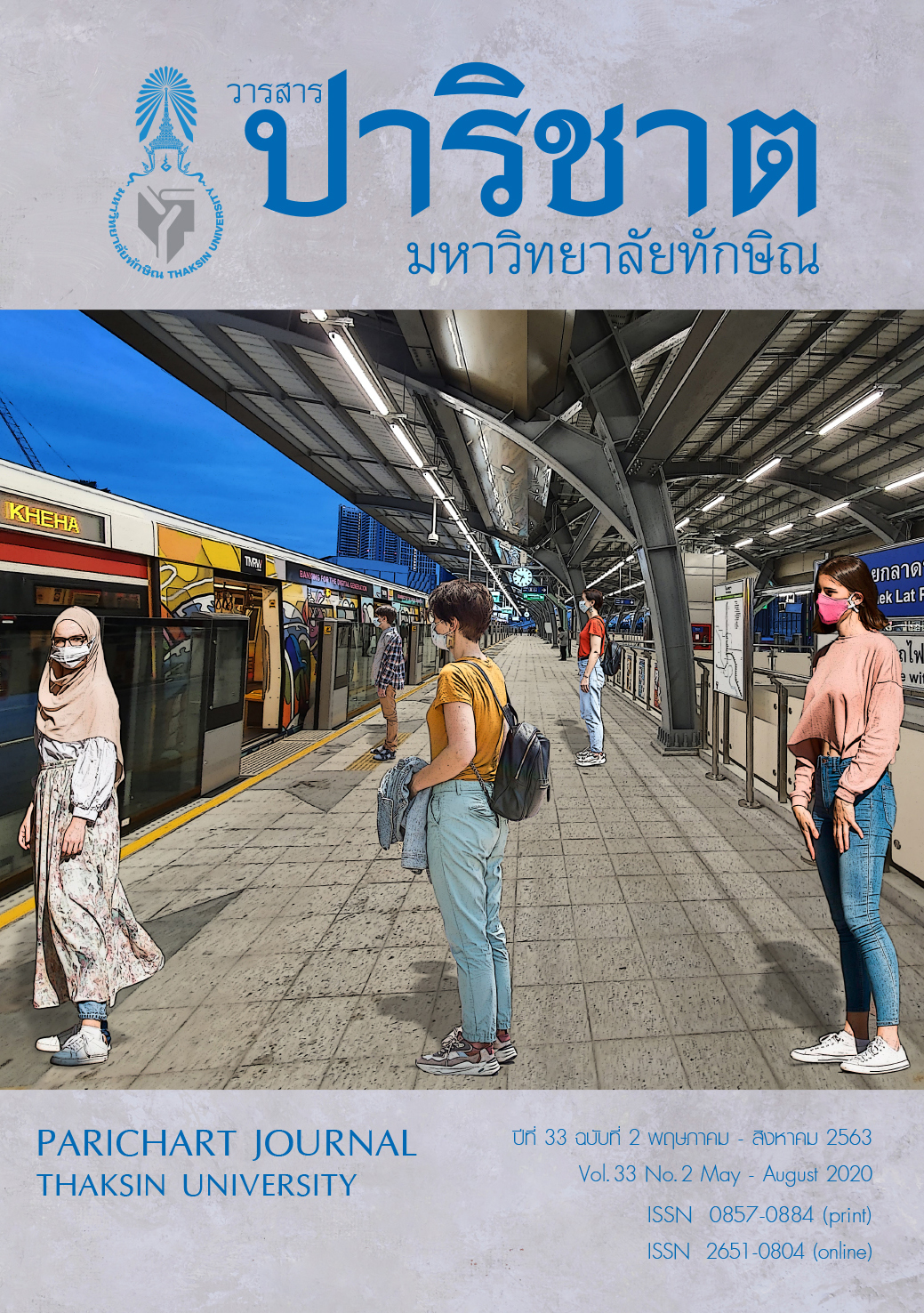The Environmental Factors Related to Facebook Addiction Behavior, Case study Undergraduate Students, Prince of Songkla University
Main Article Content
Abstract
This research article was to investigate the environmental factors relating to facebook addiction behavior among undergraduate students, Prince of Songkla University. The data were collected from 160 subjects and data were analyzed using the R program to calculate Pearson’s product moment correlation coefficients and multiple linear correlation coefficients. Use the concept of addictive behavior Analyze Facebook addiction behavior of the sample group. The results of the study revealed four environmental factors that had positive relationships with Facebook addiction behavior among undergraduate students with predictability at a significance level of .001. These included the perceptions of facebook (X1), support from social environment (X3), within family influence (X4), and time management (X5) had positive relationships with facebook addiction behaviour among undergraduate students. The perceptions of facebook (X1) had the highest level of relationship, and support from social environment (X3) the lowest. The students’ addiction behavior depends on the cognitive factors about Facebook at the highest level Understanding the benefits of Facebook, determine the appropriate time to use, and reduce addiction behavior. However, increasing the number of social media Which is one reason that helps reduce the behavior of Facebook addiction.
Article Details
References
Electronic Transactions Development Agency, Ministry of Digital Economy and Society. (2019). Thailand Internet User Profile 2018. Retrieved February 19, 2019, from https://www.etda.or.th/app/webroot/content_files/13/files/Slide_for_Stage.pdf. (in Thai)
We are social and Hootsuite. (2019). Global Digital Report 2018: World’s Internet Users’pass the 4 Billion Mark. Retrieved February 9, 2019, from https://wearesocial.com/blog/2018/01/ global-digital-report-2018. (in Thai)
Electronic Transactions Development Agency, Ministry of Digital Economy and Society. (2019). Internet for Better Life. Retrieved February 19, 2019, from https://www.etda.or.th/publishing-detail/internet-for-better-life-handbook.html. (in Thai)
Hanwattanakul, P. (2014). The Relationships Between Facebook Addiction and Environmental Influence on Student of a University in Songkhla Provice. Unpublished master’s thesis. Prince of Songkla University. (in Thai)
Banthap, D. (2013). Behavioral Addictions. Journal of Public Health and Development, 11(3), 1-1. (in Thai).
Kongrach, P. (2011). The study of Teenagers’ Behaviors in Using Social Networking Sites (SNSs) in Thailand: A Case Study of Facebook. Unpublished master’s thesis. Thammasat University. (in Thai)
Wongsopa, A., Saisrisod, S., & Yanwaree, N. (2015). The Usage Behavior on Facebook Social Media Online and Their Effects on Students’ Life Style: A Case Study of Loei Rajabhat University. Research and Development Journal, LOEI Rajabhat University, 10(33), 1-10. (in Thai).
Wutikul, Y., Rodmanee, S., & Visalboon, P. (2018). FACEBOOK ADDICTION AND EFFECT ON MENTAL HEALTH IN YOUTH. Journal of the police nurse (JOPN), 10(2), 452-460. (in Thai).
Rumnum, P. (2007). Factors effecting to student’s Internet Addiction Behavior of Elementary School in Nakhonpathom Education service office area 2. Unpublished master’s thesis. Silpakorn University. (in Thai)
Wiratchai, N. (1999). LISREL Model, Statistical analysis for Research. Bangkok: Department of Educational Research. (in Thai)
Srisa-ard, B. (2010). Preliminary research (Ed 5th). Bangkok: Suweeriyasarn publishing. (in Thai)
Tirakoat, S., & Polnigongit, W. (2018). Internet usage behaviors, literacy, and attitude towards utilization of wellness content on the internet among Thai elderly. Journal of Nursing and Health Care, 36(1) 72-80. (in Thai)
Makasiranonth, T. (2002). Internet Addicting Behavior and Factors related to Internet Addiction. Unpublished master’s thesis. Chulalongkorn University. (in Thai).
Sutin, T. (2008). Social Psychology. Nakon Si Thammarat: Walailak University. (in Thai).
Gilbert, D., Kelley, Lee L., & Barton, M. (2003). Technophobia, gender influences and consumer decision-making for technology-related products European. Journal of Innovation Management, 6(4), 253-263. (in Thai)
RuangSawat, P. (2010). Lifestyles and Behaviors in Using Social Network by office workers in Bangkok. Unpublished master’s thesis. Thammasat University. (in Thai).
Lokawich, K. (2011). The time management ability nursing students of Pathumthani University. Academic Journal of Pathum Thani University, 3(1), 27-36. (in Thai)
Thongkaew, J. (2017). Facebook Fan Page: The Identity of Teenagers in the Social Dimension. Unpublished master’s thesis. Prince of Songkla University. (in Thai)


